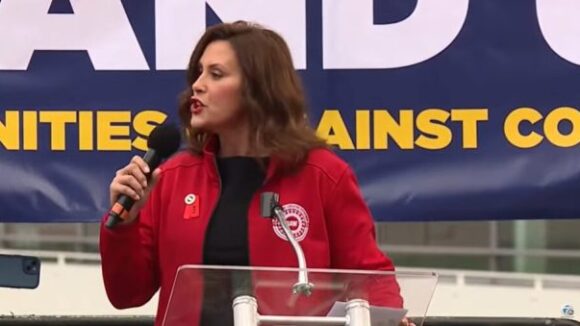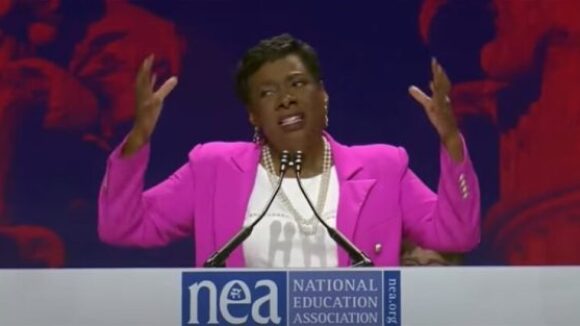Tyranny Triumphs in the Great Lakes State
Ignoring ample evidence of forced unionism’s unfairness and its damaging impact on jobs and incomes, Big Labor Michigan Gov. Gretchen Whitmer signed Right to Work destruction in 2023.
 Big Labor State Politicians at Fault For Municipal Fiscal Woes
Big Labor State Politicians at Fault For Municipal Fiscal Woes
(click to download newsletter)
New York City, Los Angeles and Chicago, the three largest cities in the U.S., are all located in states that lack Right to Work laws protecting employees from termination for refusal to pay dues or fees to an unwanted union.
And politicians in New York State, California and Illinois have done far more for Big Labor than protect compulsory unionism in the private sector.
All three states have laws on the books authorizing and promoting union monopoly bargaining and forced union dues and fees in government workplaces.
‘Over the Past 12 Years Our Pension Costs Have Gone From $1.5 Billion to $8.2 Billion’
Pro-union monopoly labor statutes enacted by state legislators and signed into law by governors in Albany, Sacramento and Springfield over the years are, the evidence strongly indicates, principal causes of the dire fiscal futures that New York City, Los Angeles and Chicago are now facing.
For example, in the Big Apple government union bosses have exploited both their monopoly-bargaining privileges and their forced dues-generated clout garnered from Albany to foist on hard-working taxpayers a bloated government retirement system they can’t possibly afford.
Shortly before he left office December 31, New York City Mayor Michael Bloomberg devoted a speech to his jurisdiction’s “out-of-control pension costs,” which he identified as a “barrier to growth” that is “especially dangerous to ignore.”
Mr. Bloomberg noted: “Here in New York City, over the past 12 years our pension costs have gone from $1.5 billion to $8.2 billion. That’s almost a 500% increase — when inflation totaled only 35% . . . .”
It Could Take a 35% Tax Hike for Chicago to Make Required Pension Payments
The Los Angeles City Council struck a similar chord January 8 when it released “A Time For Truth,” a report it had commissioned focusing on the prospects for municipal growth and fiscal stability:
“Pension costs accounted for 3% of the city’s budget a decade ago, and 18% (in 2013). The cost of covering further increases will continue to cut into the city’s ability to supply services . . . . ”
Meanwhile, according to a recent analysis for the trade journal Pensions & Investments, Chicago under state law “must raise pension contributions by $590 million in 2015, to $1.4 billion, almost 30% of the city’s operating budget after mandatory interest payments.”
According to Fitch Ratings, it would require a 35% property tax hike or an equivalent cut in all other spending for all the local governments in the Chicago area to make their required pension contributions.
National Right to Work Committee Vice President Mary King said that, while the plights of New York City, Los Angeles and Chicago are not yet hopeless, local elected officials will need plenty of help from their state capitals to pull their cities back from the brink:
“As Cate Long, a Reuters contributor who specializes in the municipal bond market, correctly observed last fall with regard to pension contributions and benefits for unionized government employees, ‘There is little discretion at the local level on these issues.’”
‘Mayors Can at Least Lay The Groundwork For Changes By Their State Assembly’
“However, mayors can at least lay the groundwork for changes by their state assembly,” Ms. King continued.
“One important thing mayors can do is to press hard and publicly for reforms, even knowing government union kingpins will never agree to them. State lawmakers can then give local governments the power to circumvent obstructionist government union bosses.
“One important way states like New York, California and Illinois can rescue their cities, if they have the will, is to roll back government union bosses’ monopoly-bargaining privileges, as Wisconsin did in 2011 in key provisions of Act 10.
“As a wide range of nonpartisan observers now recognize, Act 10 has enabled municipalities across the Badger State to save billions of taxpayer dollars while only rarely resorting to blunt instruments like layoffs.”

Ignoring ample evidence of forced unionism’s unfairness and its damaging impact on jobs and incomes, Big Labor Michigan Gov. Gretchen Whitmer signed Right to Work destruction in 2023.

Largely thanks to the Right to Work attorney-won U.S. Supreme Court decision in Janus v. AFSCME, union bosses like NEA President Becky Pringle are no longer able to block virtually all meaningful education policy reforms.

Avelo employee Kim Howard believes all the firm’s flight attendants should get to vote on continued AFA rule. Credit: WTNH-TV (ABC,…